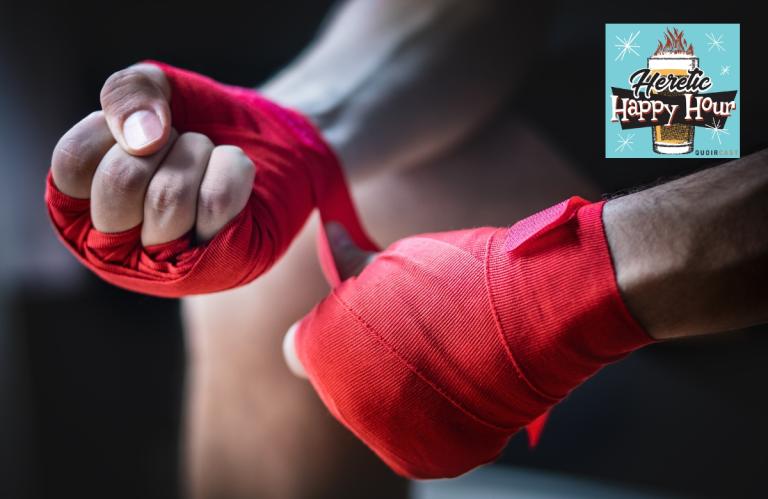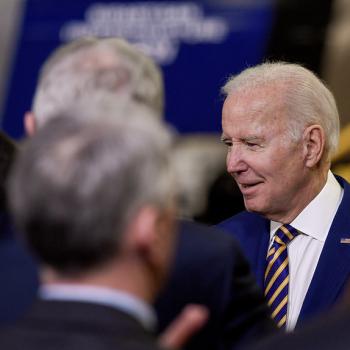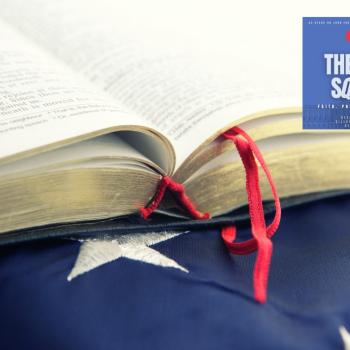
In tomorrow’s episode of Heretic Happy Hour, I discuss the peculiar case of Imane Khalif, an Algerian boxer competing in the Olympics. Here, we find ourselves at the intersection of sports, gender politics, and the boundless outrage machine of conservative circles. Khalif, who has become a flashpoint for controversy, is not just another athlete but a symbol of the absurd standards society often imposes on women. The outrage isn’t really about her boxing prowess or the sport itself; it’s about a broader, insidious discomfort with women who don’t fit neatly into predefined boxes.
Khalif, a talented and skilled athlete, has been the subject of unwarranted scrutiny. Some have questioned her gender identity or, more accurately, her adherence to traditional notions of femininity. The critics argue that she doesn’t look or act like what they think a woman should, sparking a bizarre debate over what it means to be a woman in sports.
Let’s pause here. This isn’t new. Women have always been subject to impossible standards. Society tells them they must look a certain way, act a certain way, and even think a certain way. But for women like Khalif, these expectations become an oppressive force, dictating not just how they should behave but also who they are allowed to be. It’s as if the very essence of womanhood is something to be policed, a bizarre, controlling obsession that speaks more about the insecurities of those doing the policing than the women being scrutinized.
Consider the ‘unfairness’ argument often levied at Khalif and others like her. Critics claim it’s unfair for her to compete because of her physicality. But fairness in sports is a slippery slope. Is it fair that Michael Phelps has an arm span that defies belief, giving him a natural advantage in the pool? Is it fair that Shaquille O’Neal, with his towering frame, dominated the basketball courts? The truth is, all athletes have unique attributes that can give them an edge. That’s the nature of sports. It’s a celebration of human diversity and physical prowess.
Yet, when it comes to women, especially those who don’t conform to conventional standards, the narrative shifts. The conversation becomes less about athletic excellence and more about enforcing rigid gender norms. It’s a tired, reductive discourse that fails to appreciate the complexity of human identity and the diversity of the human body.
Khalif’s situation is not just a sports issue; it’s a cultural issue. It’s a reflection of how society often struggles to accept those who don’t fit neatly into traditional categories. The conservative backlash against her isn’t really about concern for the integrity of women’s sports. It’s about discomfort with difference. It’s about a deep-seated need to control and define what is acceptable, to maintain a rigid status quo.
What’s particularly hypocritical is how this outrage emerges selectively. For instance, there’s been little to no uproar from the same circles about male athletes with questionable pasts. Take, for example, the case of Olympian Steven Van De Velde, who continues to compete despite being a convicted child-rapist. Where is the moral outrage from conservatives about his participation? It’s almost as if the concern isn’t about fairness or justice but about maintaining a narrow, patriarchal view of the world.
This selective outrage, often masked as concern for ‘fairness’ or ‘the sanctity of sports,’ is a thinly veiled attempt to reinforce outdated gender norms. It’s a distraction, a way to avoid addressing the real issues at play—issues like gender equality, the celebration of diversity, and the dismantling of harmful stereotypes.
For women like Khalif, the journey to simply exist and compete as they are is fraught with unnecessary challenges. The incessant questioning of their legitimacy as athletes or women is exhausting (especially for women!). They are forced to navigate a minefield of scrutiny that their male counterparts are often spared. This isn’t about protecting women’s sports; it’s about controlling women’s bodies and identities.
As we watch this saga unfold, it’s crucial to remember what sports should truly be about: the celebration of human potential, the thrill of competition, and the breaking of barriers. Khalif, in her resilience and strength, embodies these ideals. Her presence in the ring challenges us to expand our understanding of what it means to be a woman, an athlete, and a human being.
So, to those caught up in the outrage, I say this: let’s stop wasting our breath on meaningless debates about who fits what mold. Let’s instead celebrate the incredible diversity of athletes like Khalif. Because at the end of the day, sports—and life—are not about fitting in. They’re about standing out, challenging norms, and redefining what is possible. Khalif isn’t just fighting in the ring; she’s fighting for a broader, more inclusive understanding of humanity. And that’s a fight worth supporting.
TUNE IN TO THE HERETIC HAPPY HOUR!
Also, if you’ve been digging my work on here, and want to see me be able to continue writing as close to full-time as humanly possible, please take a look at my Patreon page at www.patreon.com/mjdistefano. Even $1 a month helps bigly!

















